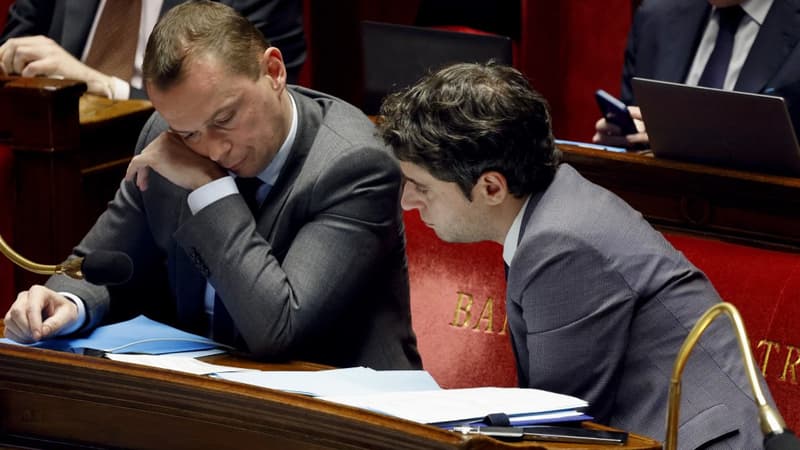Officially, don’t worry. The Government has not stopped reaffirming in recent days its willingness to do without 49.3 to approve its pension reform that should return to the National Assembly on Thursday. However, the government is far from having the necessary votes to be certain of its adoption, which makes this scenario very likely.
“We have a solid majority”, judged Emmanuel Macron this Monday afternoon during the traditional meeting of the executives of the majority, in which he does not usually participate, according to information from the Parisianconfirmed by BFMTV.
Between hope and trivialization
The same impulse of optimism for Gabriel Attal, the Deputy Minister of Budget, who advanced on France between “not seeing why it would be necessary to use 49.3”.
Olivier Véran preferred to trivialize the use of this constitutional provision that allows the adoption of a text, without going through the vote of the deputies. This “tool” has “been used, reused and heavily used under certain mandates,” judged the government spokesman at LCI.
However, the political situation in the National Assembly is enough to make the government sweat. The Executive needs 287 votes to approve the reform, and not 289, since two deputies remain vacant.
recalcitrant within the majority
On paper, if it is mostly filled and among the LRs, it gets 314 votes, therefore quite a lot. But the account is not there yet. Only 178 elected out of a majority of 249 say they will certainly vote for the text, according to the BFMTV counter.
In detail, there are 132 of the 169 Renaissance deputies who have announced that they support the text. The former minister of Emmanuel Macron has already announced that she does not want to vote for the reform “at this stage”, like several deputies who make up her movement Together.
“I have no doubt that all the deputies will vote for this text,” however, Jean-René Cazeneuve, one of the heavyweights of the majority in the National Assembly, assures BFMTV.com.
But it’s not about taking risks. The leadership of the group in the Assembly has already warned that any elected official who votes against or abstains will be excluded. In Modem and Horizons, the situation is not much better for the government. Only 27 deputies for François Bayrou out of 51 clearly said they wanted to vote. Same observation among Édouard Philippe’s lieutenants with 19 deputies out of 29.
A very divided LR group
Among Les Républicains, whom the executive saw “as an auxiliary force” at the start of the legislature, the situation is not much better. The group, headed by Olivier Marleix who, however, supports the reform, is equally divided. Only 15 deputies out of 61 clearly show that they want to vote yes.
“No one would understand that the LRs who defended retirement at 65 during the presidential campaign do not vote for it. It is really incomprehensible,” laments LR deputy Alexandre Vincendet.
As for the LIOT deputies who include many centrists and ex-macronistas, the majority should vote against the text. Suffice it to say that the government, which has no intention of backing down despite pressure from the unions, has no choice but to pull out the 49.3 cartridge.
“A flop” for Borne
Proof that there is urgency and that there is no serenity: Elisabeth Borne summoned, against all odds, the ministers in the front line on this file on Sunday night. A novelty since the arrival of the sixty-year-old at Matignon last May. It is that the Prime Minister plays very strong and she still wants to believe that she can convince the deputies beyond her own field.
“It would be a failure for her not to go to the vote after weeks of negotiations. But she is not going to take unnecessary risks. Imagine that we go to the vote and that does not happen… We would be dead”, deciphers a framework of the majority.
“If we go there, it will be because we are sure we have enough support. Otherwise, we necessarily press 49.3 ”, this deputy also advances.
“Put a coin back in the protest machine”
If the government wants to avoid this constitutional weapon at all costs, it is because it would have a devastating effect. After a review without a vote in the National Assembly in mid-February, for the moment the reform has parliamentary legitimacy only that of the Senate, which is not elected by universal suffrage.
To reach the end of the text in the Upper House, the executive has also had to draw the institutional map from the blocked vote. Coupled with unions opposing retirement at 64, massive opposition from the French and a seventh day of mobilization on Saturday, the reform is far from convincing.
“Clearly we are going to put a cog in the protest machine again and it will be difficult to respond to it,” laments an elected representative of the Renaissance.
The hope of the joint committee
Elisabeth Borne, however, is still hoping to join LR. The phone has heated up in recent days between Olivier Marleix and the prime minister. The head of the right in the Assembly is convinced that he can convince the recalcitrants of his own camp with a tool: the joint joint committee.
This body that brings together senators and representatives to reach a common version could lean to the right if certain essential requirements are maintained. Among these, we find the review clause in 2027 to see if the measures have allowed savings or even maintenance of the premium for mothers voted in the Senate.
Elisabeth Borne receives some of the members of the CMP this afternoon in the hope of getting the message across. Crossing my fingers.
Source: BFM TV


